Red Earth Read online
Page 15
Mike shook his head, and the act hurt. ‘If you were police or FBI, you would have identified yourself. If you’re plain old criminals – maybe burglars on a safari holiday – you probably would have killed me after I opened fire on you.’
‘You a cop, Michael?’
‘I’m a zoologist.’
Franklin snorted. ‘Dr Doolittle? With a nine-mill?’
‘And a .375 rifle behind the front seats of his Defender out there.’
‘The police are on their way, so we can all have a chat with them soon,’ Mike said. ‘I’ll start with getting them to charge you with breaking into my Land Rover.’
‘That’s an old trick,’ Jed said.
‘Old, but true. I left a message with a friend to call the policewoman investigating the theft of Suzanne Fessey’s car if she hadn’t heard from me by ten.’
Jed reached into the side pocket of the lightweight jacket he was wearing. Mike glimpsed the shoulder holster and the big old-fashioned Colt automatic inside. Jed pulled out a phone – Mike’s phone. He dialled the message bank and put the phone on speaker.
‘Mike, it’s Nia Carras,’ the recording began. ‘I hope you’re OK. I called Sergeant Khumalo but her partner, Sergeant Munro, told me Suzanne Fessey is with them. I’m going up there to help her with the search. Please call me and let me know you’re fine.’
‘There were a few more missed calls. Where’s “there”?’ Jed asked.
Mike wondered what the Americans wanted with Suzanne Fessey in the wake of the assassination of their ambassador. Were the armed men following the Fortuner CIA agents?
‘Nia Carras is your helicopter pilot friend. We’ve already got a line on her,’ Jed said.
‘Then you’ll know where she’s headed.’
‘The guy who answered the phone at the chopper company wouldn’t tell us, but we’ll find out. You can save us all some time, Michael, and do some good as well.’
‘Good?’
‘We’re the good guys, Michael,’ Franklin said. ‘In case you couldn’t tell already.’
They both had that bulked-up US military look about them, Mike thought, though that didn’t mean they were ‘good’, even if they were CIA, or FBI, or whatever.
‘We can wait for your police to get here,’ Jed said, ‘but that will cost us time.’
Mike thought about the situation. Jed and Franklin, whoever they were, knew about Nia, and probably more about Suzanne Fessey than they were going to let on. It wouldn’t take them long to find out where Nia was headed if they really were with a security service of some kind. He replayed the message from Nia in his mind.
‘Why are you looking for Suzanne Fessey?’ Mike asked them again.
Jed and Franklin looked at each other. Jed raised his eyebrows and Franklin shrugged his shoulders.
‘She’s important to us, Michael. Very important,’ Jed said.
‘Which is why you are in her house, with guns, snooping around and waiting to see who turned up. How long was I out for?’
‘A while,’ Franklin said. ‘We can’t wait around here all day. You going to help us or not?’
‘Why should I?’ Mike asked.
‘Because we didn’t kill you – even though you took a shot at Franklin – and we didn’t water-board you.’
Mike looked Jed in his blue eyes and the American held his gaze.
‘I can’t tell you everything, Michael, but if Suzanne is where your chopper pilot lady friend is going then you should be concerned for Nia’s safety.’
‘Let me call her,’ Mike said.
Jed held up the phone again. ‘Tried that, while you were out cold. We got sick of waiting for you to wake up. But when we did try her phone was out of range, probably because of where she’s flying. Want to tell us now where that is?’
Mike was having a little trouble collecting his thoughts after the bump on his head, but he realised what it was, now, that he’d thought odd about the message from Nia. ‘There’s no Sergeant Munro that I know of at Mtubatuba police station, where Sergeant Khumalo works.’
‘Could be an outsider,’ Franklin said, looking to Jed.
‘Maybe,’ Jed said. ‘Nia said she was going to help “her” with the search. She could have been referring to Sergeant Khumalo, or maybe this Sergeant Munro is a woman as well.’
‘Is Suzanne Fessey a criminal; is she wanted for something?’ Mike asked both men.
They looked at each other again, then Jed turned back to Mike. ‘I’ll know soon enough if you’re involved in this or not. I’ve already phoned your driver’s licence details and ID number through to the South African police.’
Mike felt his anger rise; now he was not only worried about Themba, but also Nia, as he had dragged her into this. ‘I’m not involved in anything. I’m only trying to help. Just tell me, is Nia flying into trouble? Is this Suzanne dangerous?’
‘Well,’ Jed said, stroking his beard, ‘either you do know and you’re not letting on, or you’ve really just stumbled in on this. In any case, you need to know that Suzanne Fessey could just be the most dangerous woman in Africa at the moment.’
Mike looked to Franklin. ‘I’m sorry for taking a shot at you.’
Franklin shrugged. ‘Only would have been a problem if you’d hit me. Many scientists pack Glocks here?’ he pressed.
‘Not unusual,’ Jed weighed in.
The blond, Mike realised, was the good cop in this show.
‘Are you okes going to kill me?’
Jed looked to Franklin, who shrugged. Jed turned back to Mike. ‘Probably not.’
‘Then let’s get to where Nia is going to meet Sergeant Khumalo and this Sergeant Munro, and Suzanne Fessey.’
‘Where are we going?’ Jed asked.
‘Zululand, up near the iMfolozi Game Reserve. Few hours’ drive. Tell me, did you send three men, armed with assault rifles, after Suzanne’s stolen car and her baby?’
‘Nope, but we know about them.’ He turned to Franklin. ‘Get the chopper organised.’
‘You have a helicopter?’ Mike said.
‘Michael –’
‘Mike.’
‘Mike, we have the United States Army, Navy, Air Force and Marine Corps if we need them.’
‘You think we might need all of them?’ Mike asked.
Jed stroked his beard again. ‘Maybe.’
*
Lerato held out a hand and Themba grasped it. She helped pull him onto the sandy riverbank. Behind him, the crocodile floated dead on its back. The baby was wailing.
‘Thank you,’ Themba said.
Lerato yelled, ‘Don’t thank me, get us out of here!’
‘OK.’
Lerato unfastened the child from her back and rocked him in her arms to try to soothe him. ‘Now look what’s happened, he’s going crazy. I’m going crazy. I don’t want to be out here any more. And if I put this kid down for two minutes he tries to crawl away into the bush.’
‘I know,’ Themba said. For the first time in a long time he was beginning to feel the same way she did. He did not live in comfort, but right now his modest shack and single bed with the moth-eaten blanket seemed like a king’s castle.
Themba was soaked but fortunately it was a warm sunny day. He first walked fifty metres in each direction along the riverbank, satisfying himself that the rhino wasn’t circling back to have another try at killing them, then sat down on a rock and unlaced his shoes. He wrung out his socks then took off his shirt and squeezed most of the water out of it.
Lerato was jiggling the baby, trying a variety of cooing noises to calm it. ‘He’s hungry, I think,’ she said.
‘We’re almost out of baby food.’
‘I know. We can’t let this child die of starvation, Themba.’
He stood up and went back to the water’s edge.
&n
bsp; ‘Where are you going?’
Themba shielded his eyes against the glare on the water then waded into the river again. ‘We need food.’
‘You’re going to get yourself killed, like you nearly did just now.’
‘Then cover me with the rifle.’ Themba grabbed the crocodile by its tail, giving it a shake first to confirm it really was dead. When he dragged it up onto the bank he saw it was about a metre and a half long.
‘You can’t be serious.’
He went through the pack and pulled out a Leatherman tool he’d taken from the Fortuner. ‘We have to eat.’
‘Crocodile?’
‘People say it tastes like chicken.’
‘Um, Themba, people say anything gross tastes like chicken. Personally I’d rather have KFC.’
Themba shook his head and went back to the carcass. He knelt beside it and lowered his head. He heard the crunch of footsteps behind him.
‘What are you doing now?’
‘It gave its life to feed us,’ he said. ‘I’m saying a prayer of thanks.’
He looked up at her. She had the baby on her back again and her hands on her hips. ‘You can thank me. I’m the one who killed it.’
‘Thank you.’
It was funny, he thought. She was frightened and tired and hungry, as he was, yet at moments like this she seemed forged of steel, like a statue of some warrior heroine of the struggle. Themba opened the serrated blade on the Leatherman and started to saw through the tough skin where the tail joined the main part of the body. It was hard work and blood welled up over his hand.
‘Ewww.’
Well, perhaps not quite the warrior woman. He carried on with the grisly work. He had seen men in the village cleaning slaughtered animals. Sometimes the beasts they had killed were buck, taken illegally from the national park and other game farms. Themba had grown up thinking this was perfectly acceptable, and that most animals provided food of some kind or another.
Since his time as a rhino guard, however, he had come to realise that wild animals had a greater value to man than merely the taste of their meat, or the use of their skins.
He hated the fact that they had killed the creature he had just butchered. No one he knew liked crocodiles, but Mike had taught him that everything had a part to play in the environment, that an ecosystem was about balance and acceptance that everything was there for a reason. ‘Even vultures?’ Themba had joked.
Mike had smiled at him, one of the rare times, because even though Themba thought they might be friends Mike was never truly a happy man and rarely smiled. ‘Especially vultures.’
Themba called Mike ‘Inqe’, the vulture, not to his face, but in his own mind. He had once thought of the bird as ugly and evil, a scavenger that lived on death, but Mike had taught him that without the vulture there would be disease and more death in the veldt. The vulture travelled great distances, as Mike did, in the course of its important work, and it could see very far. The inyangas used the myth that vultures could even see into the future as an excuse to peddle their heads, and while Themba did not believe that, he had believed in Mike’s vision for the future: that one day, with hard work, Themba could end up like him, working in the bush, helping to conserve wildlife, and that he would not end up dead in a gunfight or locked up in prison.
Yes, Themba thought as he dragged the crocodile’s tail back to the river and rinsed away the blood – quickly, in case another was drawn by the scent of the swirling redness – he had believed in Mike’s prophecy of the future.
But not any more.
*
Nia saw the flashing blue lights of the white police double cab bakkie ahead. She scanned for powerlines and other obstacles, but saw that the cops had picked a good, open space for her to land – by the side of the tar road from Nyalazi Gate to Mpila Camp. She brought the helicopter down.
A woman in uniform strode towards her as Nia shut down. She climbed out of the R44. The woman extended a hand and Nia shook it.
‘Sergeant Catherine Munro,’ the policewoman said, blonde hair peeking out from below her cap.
‘Nia Carras.’
‘Lindiwe, my partner, has taken Suzanne Fessey north of here. They’re setting up a second roadblock, checking all cars crossing or using the access road between iMfolozi in the south and Hluhluwe in the north. Suzanne’s gone so she can identify her baby. You’re familiar with the park and the road?’
Nia nodded; she was. ‘Good idea.’
‘We know what we’re doing, but before the missing kids reach the access road they have to cross this road first. We’ve set up in the open, as you can see, so that they can see us from a long way off. We want them to surrender peacefully to us,’ Sergeant Munro said. ‘This way, please.’
The woman led Nia towards the police bakkie, around which stood three men. The trio straightened as she approached them and Nia nodded to them.
‘This is Captain Swanepoel,’ Catherine said. ‘He’s a detective.’
Nia shook hands with the man. He had white hair that almost looked bleached and blue eyes. He gave a curt nod and smiled. ‘We’re pleased you can join in the search.’
‘Sure,’ said Nia. ‘Anything to help find a missing kid.’
‘I’ll fly with you, if that’s OK with you,’ said the captain, ‘and the sergeant will head our ground team, with my two other men.’ Swanepoel pointed to his colleagues, one black and one brown, both in plain clothes.
‘My radio’s playing up,’ said Sergeant Munro, ‘so I’ll keep in contact with Captain Swanepoel via cell phone.’
Nia shrugged. ‘Sure, fine by me. You’ll let me know if you hear from Mike Dunn, right?’
Catherine nodded. ‘Of course.’
As the sergeant turned Nia noticed a purplish stain on the collar of her uniform. ‘Hey, what happened to your shirt there?’
Sergeant Munro reached up and touched her collar, then looked back. ‘Oh, I attended a car accident this morning. One of the victims was badly hurt. All part of the job, you know.’
Nia nodded. She had seen more than her fair share of car crashes from the air and like all South Africans knew only too well that her country had a terrible road toll. It was odd, however, that the policewoman would have blood on the back of her uniform, and not the front. Sergeant Munro was quite pretty, Nia thought, though she looked like she had been in a few scrapes. Her face would have been almost perfect if it wasn’t for the scar across her left upper cheek.
‘OK, can we get airborne, please?’ the captain said. ‘I don’t want to seem pushy, but there are young people at risk somewhere out there in the bush.’
‘Right,’ Nia said.
They walked to the helicopter and Catherine went to her police truck. Swanepoel was striding ahead of her and already getting up into the chopper.
‘I’ll give you a quick safety briefing,’ she said, climbing in beside him.
‘I’ve been in plenty of helicopters,’ he replied.
He was pushy. ‘Well, you haven’t been in mine, and I’m required by my employers to give you a briefing.’
‘Very well.’
She noted his impatience and cared nothing for it. Delaying their take-off by a minute would make no difference. Nia went through her briefing, ignoring the captain’s rolled eyeballs, handed him a set of headphones, then she started the aircraft.
While Nia was going through her checks she felt her phone vibrate in the pocket of her flight suit. She pulled it out and saw Mike Dunn’s name on it. Normally she might have ignored a call at this point, as she needed to concentrate on her pre take-off procedures, but she had been worried when Mike hadn’t called her. She glanced at Swanepoel, whose raised eyebrows seemed to ask, What now?
Nia answered the call, which only she could hear. ‘Hi, I was worried,’ she said by way of greeting.
Mike’s voice came
through her headphones. ‘Nia, I called your base. Are you up in Zululand already?’
‘I am.’
‘Are you alone?’
She glanced left again and saw the captain drumming his fingers on his trouser leg. ‘No.’
‘Don’t let on it’s me you’re talking to.’
‘OK.’ She wondered what was going on. Above the background noise of her own engine warming up she thought it sounded like Mike was driving, as he was talking loudly over the sound of another machine.
‘Did you meet this Sergeant Munro person you mentioned in your message to me?’
Swanepoel was holding his wristwatch up to her now, tapping the glass. She held up a hand to him. ‘I did.’
‘Nia, the people I’m with, some Americans, security people, contacted Mtubatuba police station. They confirmed what I thought, that there is no Sergeant Munro there. They’ve been trying to contact Lindiwe Khumalo by radio and phone and there’s no answer from her. Something’s very wrong. Can you get somewhere to talk alone?’
‘Not really, no.’ She felt her heart beat faster and a chill spread through her body.
‘OK. Sergeant Munro – was she blonde, about five-five, blue eyes, with a scar on her left cheek?’
‘Yes. How did you …?’
‘Nia, shit. Listen to me. Get away from whoever you’re with.’
‘I’ll try. Give me a second.’
Nia leaned forward and made a show of touching a couple of gauges. She switched the headset control from her phone to the intercom, so that she could now talk to the man next to her.
‘We’ve got a problem,’ she said into her microphone.
‘You can say that again. We need to get airborne and find those kids. Now.’
‘We’re not going anywhere. I’ve got a problem with my engine temperature.’ She could see, even as she spoke the words, his eyes scanning the gauges, looking for the warning sign. She ought to have thought of something cleverer, but she was also fighting a rising tide of panic.
‘I can’t see anything wrong,’ he said into his mike. ‘You’d better not be …’
Nia flicked back to the phone channel, cutting the man off.
‘Nia, hello, are you there?’ Mike was saying. ‘That woman; she’s really Suzanne Fessey, the one whose child is missing. She’s no innocent victim of crime, though, she’s …’

 The Cull
The Cull Blood Trail
Blood Trail Red Earth
Red Earth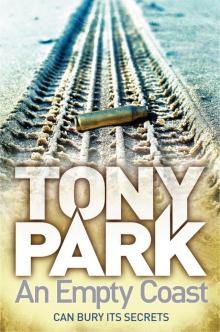 An Empty Coast
An Empty Coast Dark Heart
Dark Heart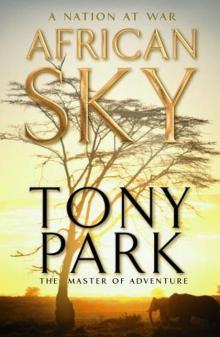 African Sky
African Sky The Delta
The Delta Captive
Captive Ivory
Ivory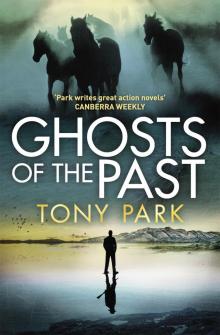 Ghosts of the Past
Ghosts of the Past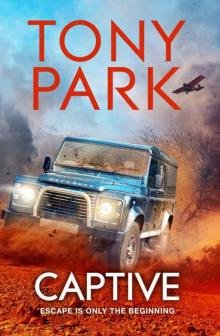 Captive_A High-octane And Gripping African Thriller
Captive_A High-octane And Gripping African Thriller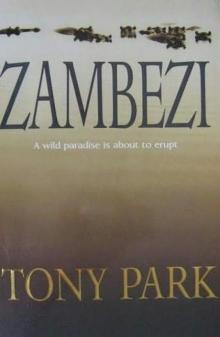 Zambezi
Zambezi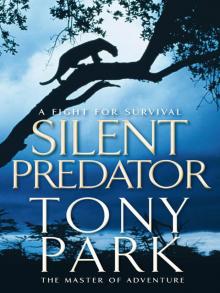 Silent Predator
Silent Predator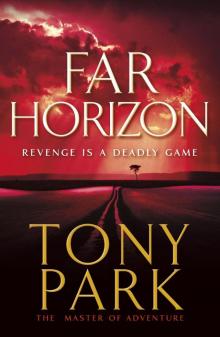 Far Horizon
Far Horizon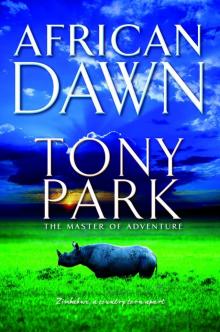 African Dawn
African Dawn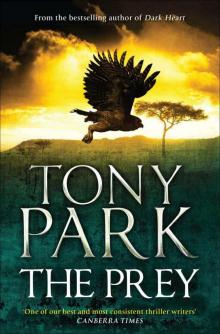 The Prey
The Prey Safari
Safari